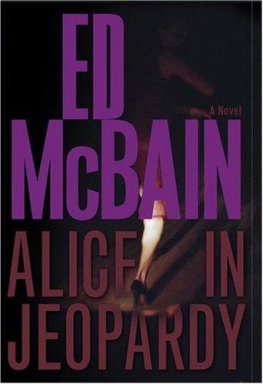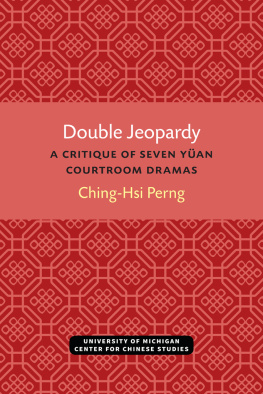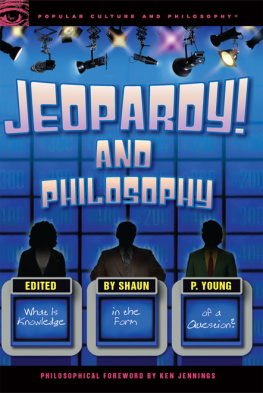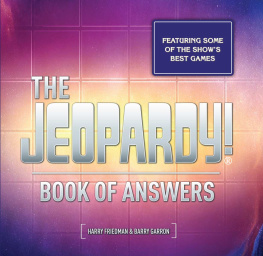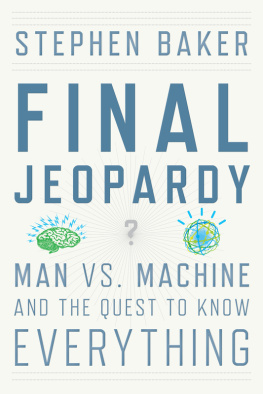Double Jeopardy
Double Jeopardy
The History, the Law
George C. Thomas III

NEW YORK UNIVERSITY PRESS
New York and London
Copyright 1998 by New York University
All rights reserved
Library of Congress Cataloging-in-Publication Data
Thomas, George C. (George Conner), 1947
Double jeopardy : the history, the law / George C. Thomas, III.
p. cm.
Includes bibliographical references and index.
ISBN 0-8147-8233-7 (cloth : acid-free paper)
1. Double jeopardyUnited StatesHistory. I. Title.
KF9245 .T48 1998
345.7304ddc21 98-25367
CIP
New York University Press books are printed on acid-free paper,
and their binding materials are chosen for strength and durability.
Manufactured in the United States of America
10 9 8 7 6 5 4 3 2 1
To Frank W. Miller
Mentor, Scholar, Teacher
Who showed me the way to double jeopardy
Contents
Acknowledgments
When I wrote my LL.M. thesis at Washington University in St. Louis in 1983, I began to think about writing a book on double jeopardy. In the intervening fifteen years, more people helped me than I can possibly thank. But I would be remiss if I did not name a few.
My LL.M. and J.S.D. thesis committee (Professors Kathleen Brickey, Ed Imwinkelried, and Frank Miller) gave me the right amount of guidance mixed with grief.
I had the benefit of excellent research assistants; Howard Baum, Nick Costantino, David Griffin, Lynn Miller, and Rebekah Wanger provided particular support to the double jeopardy project. A brave and talented group of Rutgers students served as guinea pigs for the manuscript in the fall of 1995 by taking my seminar on double jeopardy. Their thoughts and critiques helped shape the final version.
The book was also shaped by a University of Pennsylvania criminal law workshop and a Rutgers faculty colloquium. Both groups asked provocative, probing questions, some of which I have only partly answered. Many readers offered helpful comments outside the colloquium or workshop context: Roger Abrams, Gary Francione, Doug Husak, Greg Mark, Michael Moore, and Stephen Morse. The comments of two anonymous reviewers were also extremely helpful. My colleague Ron Chen translated, with skill and patience, many Latin sources for me.
Much support (ranging from financial to friendship) came my way from Roger Abrams and Peter Simmons, my deans at Rutgers Law School, and Choong Soon Kim, my department chair at the University of Tennessee at Martin.
My first research assistant at Rutgers, Marsha Wenk, worked closely with me as an early version of the current blameworthiness theory began to take shape in 1987 and 1988. She continued to critique and help shape my thinking on double jeopardy until her untimely death in 1995.
As with all human projects, this one required not a little luck and much assistance from others, only some of whom I have named here. I thank everyone and appreciate the luck.
Introduction
The United States Supreme Court has failed to achieve a stable interpretation of the Double Jeopardy Clause. This is surprising because the American double jeopardy prohibition partakes of a Western legal concept that is both ancient and fundamental. A specific bar against double jeopardy has existed in the common law at least since the confrontation between Henry II and Saint Thomas Becket in 1164. More generally, laws against changing a final judgment can be traced to the Code of Hammurabi.
At one level, a bar against double jeopardy is a self-evident protection that is inevitable in any legal system. No legal system can survive without some bar against relitigating the same issue over and over. And if there is to be a bar against multiple determinations of the same question, why should the number of permissible determinations be anything other than one? Once a tribunal has determined the facts and law, there is no reason to think that a second tribunal would be any more likely to reach the right or just outcome (however we might define those terms). Indeed, if two tribunals returned different verdicts in the same case, there would be no a priori reason to prefer one to the other, and thus no reason to prefer a second trials outcome to the first.
Viewed in this way, stripped to its core, there is nothing difficult or controversial about double jeopardy. If D is convicted or acquitted of murdering his ex-wife, he cannot again be tried for the murder of his ex-wife. The Double Jeopardy Clause captures this self-evident principle in an arcane formulation: nor shall any person be subject for the same offence to be twice put in jeopardy of life or limb. The clause thus forbids a second jeopardy of life or limb for the same offence.
At the core, both jeopardy and same offense have a self-evident, uncontroversial meaning. The self-evident meaning of same offense is identical offense. First-degree premeditated murder is the same offense as first-degree premeditated murder, of course, but not much else is obvious about the same offense question. Felony murder is a killing in the commission of a felony (for example, robbery, rape, kidnapping). Suppose D is acquitted of premeditated murder; can he be charged later with felony murder for the same killing? Could he be charged with kidnapping if convicted of premeditated murder? Could he be charged with kidnapping if convicted of felony murder based on kidnapping? Moreover, there is a civil/criminal distinction that is worrisome. O. J. Simpson was tried for the civil tort of killing his ex-wife and her friend Ronald Goldman after being found not guilty of the same murders in a criminal trial. Why is this not double jeopardy? The self-evident meaning of same offense is not ultimately helpful.
The self-evident meaning of twice in jeopardy is a second criminal trial. But if a second criminal trial is always a second jeopardy, a judge could never declare a mistrial without triggering a double jeopardy bar, regardless of how many errors had infected the trial and regardless of how much the defendant wanted a mistrial. Moreover, appellate courts could never reverse convictions and remand for a new, error-free trial. (Indeed, this complaint was lodged by the Framers against James Madisons original language forbidding more than one trial for the same offense, as I discuss in .) Judges would be loathe to declare mistrials and reverse convictions under that regime, and defendants would be harmed. It appears again that something other than the self-evident meaning must be sought.
Even if we accept the self-evident meaning of twice in jeopardy as more than one trial, the Clause does not prohibit all second jeopardies, just second jeopardies of life or limb. Literally construed, this additional parameter limits double jeopardy protection to capital offenses and offenses with the nonexistent penalty of amputation. So a strict self-evident meaning of second jeopardy would limit the Double Jeopardy Clause to capital offenses. There is no historical evidence to support that reading of the language.
Finding an understanding of same offense or second jeopardy beyond the self-evident reading is not an easy task. Some examples will introduce the difficulties. In Case One, the defendant caused two deaths in an automobile accident. He pled guilty to the traffic offense of failure to reduce speed to avoid an accident and was later prosecuted for involuntary manslaughter. There is no doubt that a guilty plea is a conviction and no doubt that an unreversed conviction is the end of one jeopardy. The issue, then, is whether failure to yield is the same offense as vehicular
Next page

